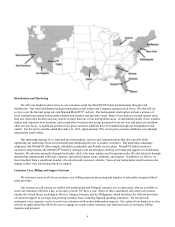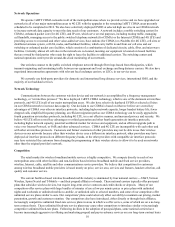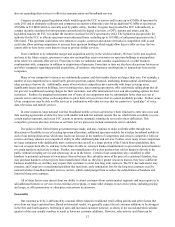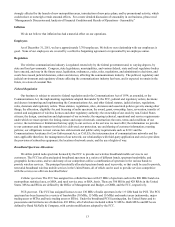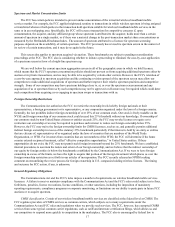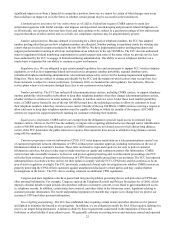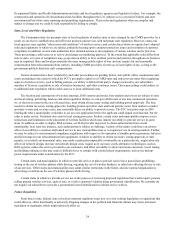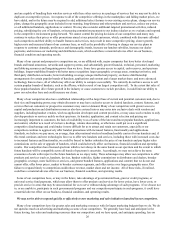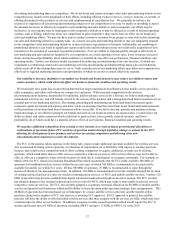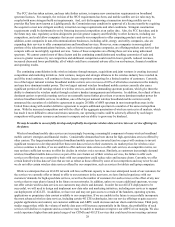Metro PCS 2011 Annual Report Download - page 29
Download and view the complete annual report
Please find page 29 of the 2011 Metro PCS annual report below. You can navigate through the pages in the report by either clicking on the pages listed below, or by using the keyword search tool below to find specific information within the annual report.18
reduce unreasonable disparities in the regulatory treatment of similar wireless broadband mobile services, such as cellular,
broadband PCS, AWS, 700 MHz, and Enhanced Specialized Mobile Radio, or ESMR, services, and federal law preempts state
rate and entry regulation of CMRS providers, but allows states to regulate the other terms and conditions of service.
The FCC has found, for the time being, that wireless broadband Internet access service offered at speeds in excess of 200
kbps in at least one direction, which would include our 4G LTE services, is an information service under the Communications
Act, and thus is not subject to traditional common carrier regulation. In addition, the FCC has found that the transmission
component of wireless broadband Internet access service meets the definition of telecommunications under the
Communications Act and that the offering of a telecommunications transmission component as part of a functionally integrated
Internet access service offering is not a regulated telecommunications service ,but rather as an information service, under the
Communications Act. Further, the FCC has found that mobile wireless broadband Internet access service is not a “commercial
mobile service” under Section 332 of the Communications Act. Carriers offering mobile wireless broadband Internet access
services are not considered common carriers and have no common carrier obligations with respect to this service. Accordingly,
as a result of such classification decisions, we and our competitors generally have greater flexibility in establishing the terms
and conditions, including pricing, of this service than we do for services classified as common carrier services. However, these
classification decisions could change over time, either as a result of FCC or Congressional actions, in an effort to assure that
competing services are subject to comparable regulatory requirements. For example, the FCC has adopted rules, commonly
referred to as the “Net Neutrality” or “Open Internet” rules, subjecting mobile wireless broadband Internet access providers,
such as us, to certain transparency requirements, and certain restrictions on the blocking of access to lawful websites and some
third party applications, subject to reasonable network management provisions, which could limit our ability to provide certain
services, requires us to not block customers' access to services competitive with our voice and video telephone services, and
could limit our ability to establish the terms and conditions, including pricing, of Internet access offered by us. “See - Network
Management and Net Neutrality.”
The FCC permits wireless broadband mobile services licensees to offer fixed services on a co-primary basis along with
mobile services. This facilitates the provision of wireless local loop service by CMRS licensees using wireless links to provide
local telephone service. The extent of lawful state regulation of such wireless local loop service is undetermined. While we do
not presently offer a fixed service, our network can accommodate such an offering. We continue to evaluate our service
offerings, and may offer a fixed service at some point in the future, which may subject us to additional state regulation.
Roaming. The FCC long has required CMRS providers to permit customers of other carriers to roam “manually” on their
networks, for example, by supplying a credit card number, as long as the roaming customer's handset is technically capable
with the roamed-on network. The FCC also has ruled that automatic voice roaming is a common carrier obligation for CMRS
carriers and CMRS carriers must provide certain automatic voice roaming services to other CMRS carriers upon reasonable
request and on a just, reasonable, and non-discriminatory basis pursuant to Sections 201 and 202 of the Communications Act.
Specifically, this automatic voice roaming obligation extends to services such as ours that are real-time, two-way switched
voice or data services, such as short message services, that are interconnected with the public switched network and utilize an
in-network switching facility that enables the provider to reuse frequencies and accomplish seamless hand-offs of subscriber
calls. Automatic voice roaming rights are important to us because we provide service in a limited number of metropolitan areas
in the United States and must rely on other carriers in order to offer roaming services outside our existing metropolitan areas.
All the service plans we now offer to new subscribers (and to all existing customers who opt-in) include certain roaming
coverage where we have not yet constructed our network or where we do not have licenses to provide service.
The FCC clarified in April 2010 that the automatic voice roaming obligations of broadband CMRS providers extend to
both in-market and out-of-market automatic voice roaming provided that the request is reasonable. In assessing whether a
request is reasonable, the FCC will consider the totality of the circumstances and may use a number of factors, including the
technical compatibility of the roamer, the extent of the requesting carrier's build-out where it holds spectrum, and whether
alternative roaming partners are available, to determine whether a particular roaming request is reasonable. Our potential
roaming partners may utilize these factors to deny requests by us for automatic voice roaming services for our customers.
In 2011, the FCC found that the automatic roaming obligation should be extended to services that are classified as
information services (such as high speed wireless Internet access services) or to services that are not CMRS. The FCC found
that such automatic data roaming, while not a common carrier service, nonetheless shall be offered by the providers of such
services on a commercially reasonable basis, when technologically compatible and technologically feasible. In doing so, the
FCC may use a number of factors to determine the commercial reasonableness of a request for such services, including the
technical compatibility of the roamer, the extent of the requesting carrier's build-out where it holds spectrum, and whether
alternative roaming partners are available, to determine whether a particular roaming request is reasonable. If we are unable to
obtain automatic data roaming at reasonable rates, we could have difficulty attracting and retaining certain groups of customers,
especially customers using Smartphones, including Android handsets, or our 4G LTE services. Verizon Wireless currently is



